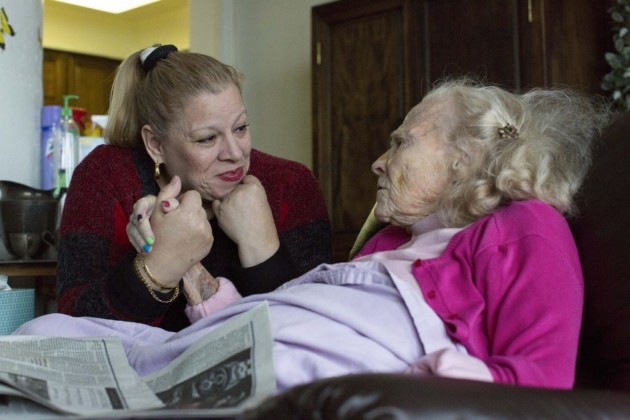The Lilith Blog 1 of 2
September 18, 2017 by Chanel Dubofsky
Don’t Miss This “Quietly Devastating” Film on Home Health Care Workers
 Here are two things to know about Deirdre Fishel’s film, Care (which you can watch here for the time being): It is quietly devastating. And it is essential viewing for everyone.
Here are two things to know about Deirdre Fishel’s film, Care (which you can watch here for the time being): It is quietly devastating. And it is essential viewing for everyone.
Care is about the experiences of 4 home health care aides,the folks they take care of, their families, and the realities of the industry. Providers, who are usually women of color, are living at or under the poverty line. The caregivers we meet in the film are skilled practitioners who love their jobs, yet they struggle to ensure that their own families provided for.
The film connects its viewer to its subjects and content in a way that’s unflinching, one of the aspects of the documentary that makes it deserving of the “devastating” adjective. You can’t look away, and you’re not supposed to. Taking care of an elderly or sick person is an intimate act, and Fishel shows it to us—washing, exercising, putting them to bed. Vulnerable moments like these are not just there to illustrate an experience, but to connect us to the people giving the care, and receiving it.
It’s easy to talk about Care and what makes it special without giving away spoilers. The first person we meet in the film is Vilma, a Costa Rican woman who takes care of Dee, a 92 year old living in her own apartment in Staten Island. Dee never married, or had children, and retired at the age of 90. Her friends describe her as a feminist. She requires help doing most things, including showering. It’s sobering, particularly for those of us who don’t aspire to marriage and/or children, and who relish our independence. Are we supposed to learn a lesson from Dee? Independence? Get married and have children so that they will take care of you? If you don’t conform, you’ll be all alone?
“Because the system is so messed up, all the other oppressions within it get magnified,” said Zahara Zahav, a community organizer with Jews for Racial and Economic Justice (JFREJ). “You should be able to live a life that you’re proud of and not suffer because of that. One of the things we’re thinking about in making change around health care is a different kind of feminism, in which everyone gets what they need.” JFREJ and its organization of domestic workers and their employers have conversations about caretaking, needs, and support, particularly around eldercare, featured in the film.
One of Care’s primary messages is that ability is a temporary state for all of us—at some point in our lives, we will need taking care of, and if we aren’t going to get that help from our biological or chosen families, we will need to have access to care providers. And since the current state of health care is both difficult to navigate and cost prohibitive, getting help from someone who cares about their work and is good at it is less and less possible. “People who want to be health care workers are told not to do it,” said Zahav. “It’s really hard work, but the work is so often unvalued.” Literally. Because home health care workers are working in homes, as opposed to in medical facilities, there are little to no protections for them. The median income for a home health care aid is $13,000/year. And though the Domestic Worker’s Bill of Rights was signed into law in New York in November 2010, the task of making sure that workers (especially undocumented workers) and their employers are aware of it continues.
Watching Care and processing it with others is one step you can take towards understanding the issues facing home health care workers and those they care for. You can also join Caring Across Generations’ campaigns to change policy around health care and to bring home health care into public view, instead of letting it remain invisible.
“This work is about answering the question of how we’re going to take care of each other,” said Zahav. “Care is a vital part of that, because it involves storytelling, making connections—what’s going on for the person who’s taking care of the person that you love? That’s revolutionary, it’s transformational. It’s about how the personal is political.”
The views and opinions expressed in this article are the author’s own and do not necessarily reflect those of Lilith Magazine.
 Please wait...
Please wait...